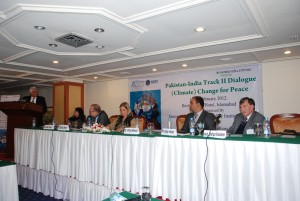Experts stress for bilateral cooperation to bring prosperity to the region: SDPI Conference
Monday, February 13th, 2012 6:43:06 by Fayyaz Yaseen
Experts stress for bilateral cooperation to bring prosperity to the region: SDPI Conference
ISLAMABD:(13 February 2012) Bilateral cooperation between Pakistan and India can turn the climate change threat into an opportunity for ensuring peace and prosperity in both countries as well as in South Asian region, said delegates
from India and Pakistan while speaking at the track-II dialogue here on Monday. They stressed for further and continuous dialogue in order to devise a regional strategy to deal with the existential threat of climate change and to provide a participatory and
policy-oriented assessment of environment, natural resources and their implications for South Asia.
They said it at the opening day of 3-day track-II dialogue titled ‘Pakistan-India Track II Dialogue on (Climate) Change for peace’ organized by Sustainable Development Policy Institute (SDPI) and Center for Science and Environment
(CSE), India with the support of Heinrich Boll Stiftung (HBS) here on Monday. The event prompts to develop an actionable agenda for climate change in Pakistan and India in the areas of water, energy, gender, climate change adaptation and livelihood aiming
at normalization of relations between India and Pakistan by engaging experts and civil society representatives from both sides in Track-2-consultations on issues of mutual interest.
Chairing the opening session, Dr Ishfaq Ahmad, Advisor Planning Commission of Pakistan on Climate Change and Development emphasized that India and Pakistan are facing common adversaries in the shape of climate change that needs
collective response to deal with it. He said, we must at least narrow down the gap particularly on water, if not on all issues, and institutionalize and devise appropriate strategies for climate change adaptation.
Britta Peterson, Country Director, Heinrich Boll Stiftung (HBS) Pakistan urged the delegates to take the advantage of this platform and come up with new and practical ideas. “Gravity of situation needs concrete efforts to carve
out a realistic roadmap for Indo-Pak collaboration on combating climate change and to provide comprehensive, policy-relevant, science-based assessment of environment in South Asia to policy maker” she added.
Shafqat Kakakhel, Senior Advisor SDPI, and Former Deputy Executive Director, United Nations Environment Programme (UNEP) spoke the on need of collaboration between India and Pakistan and South Asian countries on climate change.
He said Pakistan and India must discuss and explore vistas of cooperation on climate change as both countries have an integrated ecological system with shared natural resources adding that only regional cooperation can help to address the existential threats
of climate change. He said water availability in the region is highly susceptible due to climate change which affects glacial melt and monsoon system that feeds the rivers in sub-continent. He was of the view that SAARC can be instrumental and must serve as
principle vehicle for sub-regional cooperation on issues related to environment, climate change and socio-economic development in the region. “However, there is a negligible progress on translating the SAARC commitments made at Dhaka and Thimphu Summits into
practical actions, mainly due to lack of political will, weak environmental cooperation in the region and absence of a serious attitude of countries towards SAARC” he maintained.
Axel Harneit Sievers, Country Director, Heinrich Boll Stiftung (HBS) India, said dialogue on climate change between two countries is essential to systematically improve relations and particularly discuss issues where both countries
have a common position.
Shakeel Ahmad Ramay, Senior Research Associate, SDPI briefed participants about the objectives and goals of conference and maintained track-II dialogue is aimed at providing platform for experts and people across the border to
come and discuss the possibilities for cooperation under climate change regime with joint research-policy-action and sharing of technology, knowledge and experiences.
Sanjay Vashist, Programme Advisor Climate Change, Heinrich Boll Foundation, India Office said, climate change threat can be converted in to an opportunity through effective bilateral talks and coordination between the two countries.
He further added that climate change poses serious threats to development process in South Asia and we must need to move ahead leaving behind minor differences in mutual benefit of billions of people in South Asia.
Earlier, a documentary on climate change was screened which is produced by Sustainable Development Television (SDTV) team and its Editor, Tahir Dhindsa. The documentary gave an overview of state of environment, depleting natural
resources, developmental challenges while underlining the need for SA regional cooperation in general and between India and Pakistan in particular on issues of common interest.
Short URL: https://www.newspakistan.pk/?p=12591

















